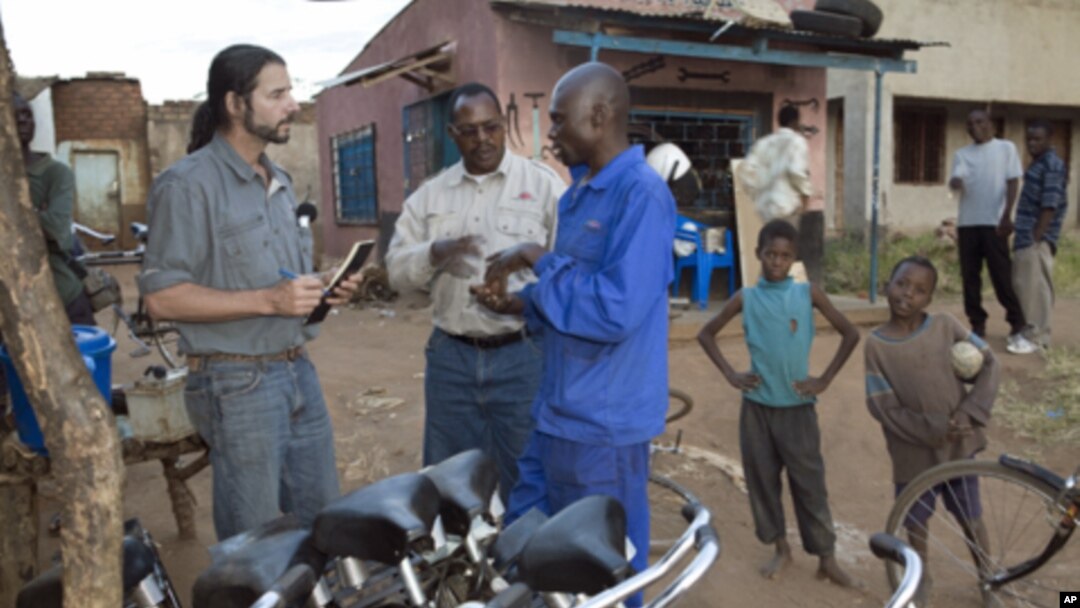When Frederick Day was a little boy his dreams kept him awake at night. He lost sleep talking with his older brother Stanley under the covers. "And Stan would say, 'Hey F.K, are we going to go into business together?' And I'd go, 'Yeah Stan. Stan, are we going to go into business together?' And he'd go, 'Yeah. I'm going to figure that out.'"
F.K., as he was called by his friends, came from a business-minded family. In the 1960s they lived outside Detroit, Michigan, the nation's motor capital, where his father owned an auto parts plant. "He would carry us around in a basket on the end of a forklift and show us where most of the aluminum castings were made."
Going into business for himself
Day's business would be on two wheels. He remembers a day in the mid-1980s when Stanley came home from a bike trip tired and frustrated. He complained that the gear shift was on the frame of the bike and not on the handlebars where it would be easier to reach. The brothers figured a handlebar grip shifter could make them millions. So they designed a prototype and wrote a business plan. They expected to sell five million within three years.
"And then maybe we'd retire and go sit on the beach somewhere," Day says.
That's not exactly the way it happened. They sold 800 that first year, half of which were returned. But, Day says they did learn a valuable lesson. "If you focus on the end users' needs, and keep evolving and developing the product, you will get there."
The Day brothers believed the grip shift could change biking habits. So they accelerated their marketing efforts. Consumers who used it helped promote the innovation, which has since become industry standard. It turned the brother's idea into what today is the second largest bicycle component company in the world. SRAM has 3,000 employees and more than a dozen locations in United States, Europe and Asia.
Helping others
That same spirit is at work today with World Bicycle Relief. F.K. Day began the non-profit in 2004, in response to the tsunami in Sri Lanka. The group now has a foothold in Zambia and other Sub-Saharan African countries.
World Bicycle Relief helps people gain access to health care, education and a job, according to Lameck Kasanga. The Zambian outreach worker is coordinating delivery of more than 50,000 bikes to school children, teachers and educational volunteers in his country.
"A bicycle is a tool which can help a child go to a clinic, access education and they can even ferry vegetables to sell so that they have money to pay for school fees," says Kasanga. "So a bicycle is really helping the child, even the parents and even the neighbors can borrow the same bicycle."
F.K. Day says kids keep the bikes only if they stay in school. At a recent event in Zambia, where over 100 were given out, Day was moved with what headmaster had to say.
"There were tears in his eyes. He talked about how absenteeism was down, attendance was up, grades were up and oddly, crazily, which I never expected, early marriages were down." That's because when girls stay in school they have more options.
World Bicycle Relief
In 2006, World Bicycle Relief gave 23,000 bikes to volunteer health workers who were offered a similar incentive. Stick with the job and keep the bike. What they ride are sturdy models that Day designed especially to withstand Africa's often rugged roads and carry heavy loads. They're built in Africa, using local manufacturers and suppliers. The nonprofit also trains a core of mechanics to make repairs.
Day figures he's given away over 70,000 bikes so far. The bikes are also sold to retailers, farmers and builders who can afford them. Day says that helps stimulate the economy in rural areas. "If we can get businesses to focus in on developing products and developing and transferring technologies to solve the bottom of the market in those areas, I think gigantic, dramatic and deep and lasting impact will be had."
F.K. Day says these untapped economic markets in poor nations offer the private sector an opportunity to provide goods and social services that are so badly needed to reduce poverty and improve lives.


